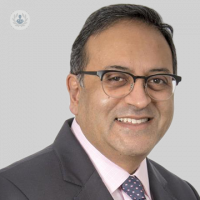How is vulval cancer treated?
Autore:In this article below, Mr Rahul Nath, an esteemed gynaecologist, details what vulval cancer is, outlines the risk factors associated with vulval cancer, and tells us how this specific type of cancer is diagnosed and treated.

What is vulval cancer?
Vulval cancer refers to cancers developing in the external sex organs (the vulva). Vulval cancer can start in any part of the vulva, but most commonly occurs in the inner edges of the outer and inner lips (labia minora). Sometimes, it may also occur in the area of skin between the vulva and the anus.
How common is vulval cancer?
Vulval cancer is not actually a very common disease. It currently accounts for less than one per cent of all new cancer cases in the UK. More than 55 per cent of cases in the UK each year occur in women aged 70 and over, with the highest rates being seen in women aged 90 and over, and it is estimated that one in every 275 women in the UK will be diagnosed with vulval cancer during their lifetime.
What are the risk factors?
It is estimated that about 40 per cent of cases in the UK each year are linked to lifestyle. The most common risk factor appears to be human papillomavirus (HPV) infection.
Other factors that appear to increase the risk of vulval cancer include smoking and conditions that lower the body’s ability to clear HPV infection, such as organ transplantation, autoimmune diseases, and human immunodeficiency virus (HIV).
How is vulval cancer diagnosed, and what are the symptoms?
There are various symptoms associated with vulval cancer that can help a medical professional diagnose the cancer. These symptoms include:
- persistent itching
- pain
- thickened or discoloured patches on the skin of the vulva
- burning pain when passing urine
- vaginal bleeding or discharge
- a lump or swelling in the vulva or groin
The diagnosis of vulval cancer is usually made through an examination of the vulva and taking a sample of tissue (a biopsy) from the affected area.
How is vulval cancer treated?
The treatment of vulvar cancer may include surgery, chemotherapy, and/or radiotherapy. Your doctors will discuss the different options with you, to help you make the right choice for you.
Mr Rahul Nath is a renowned London-based gynaecologist. Make an appointment with him today via his Top Doctors profile.


